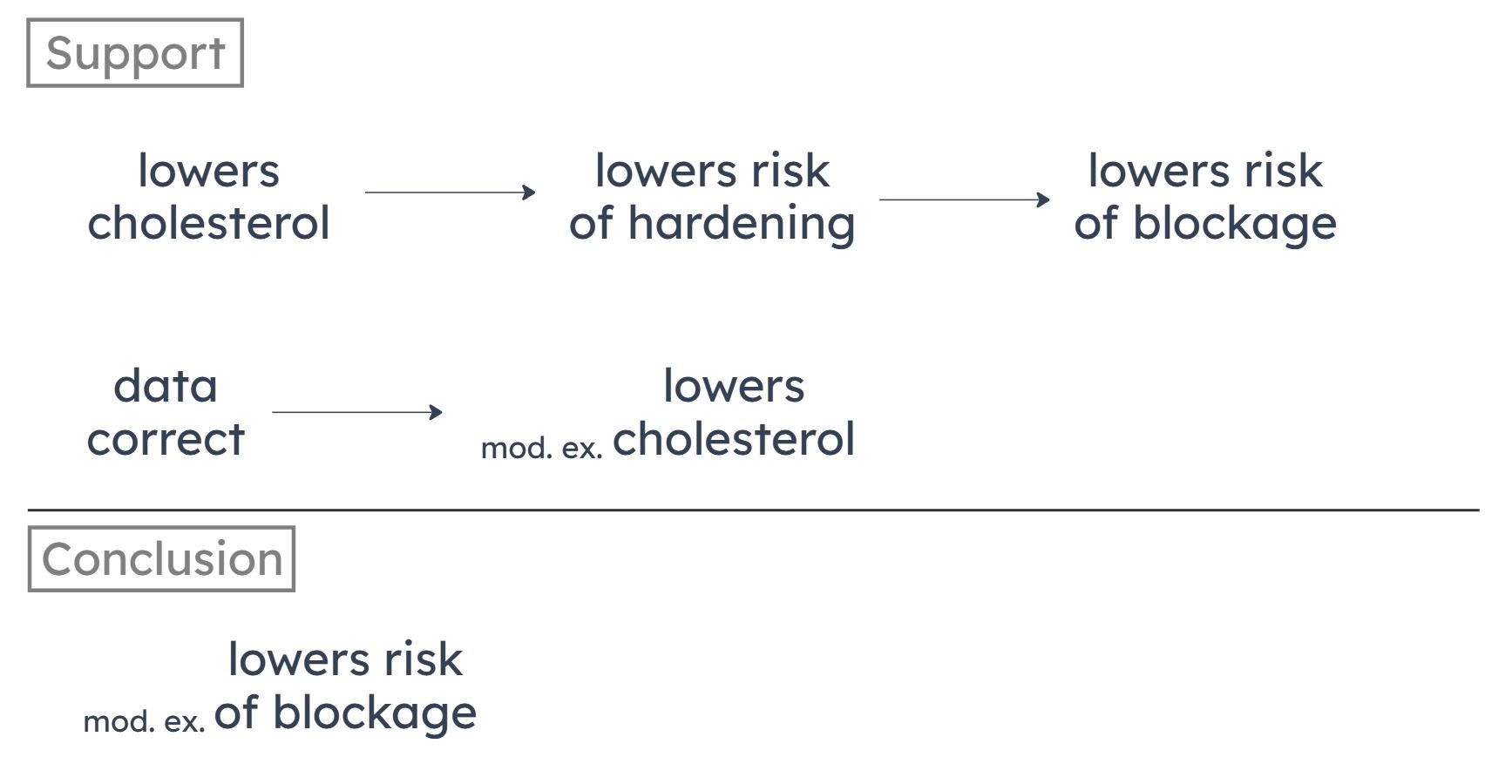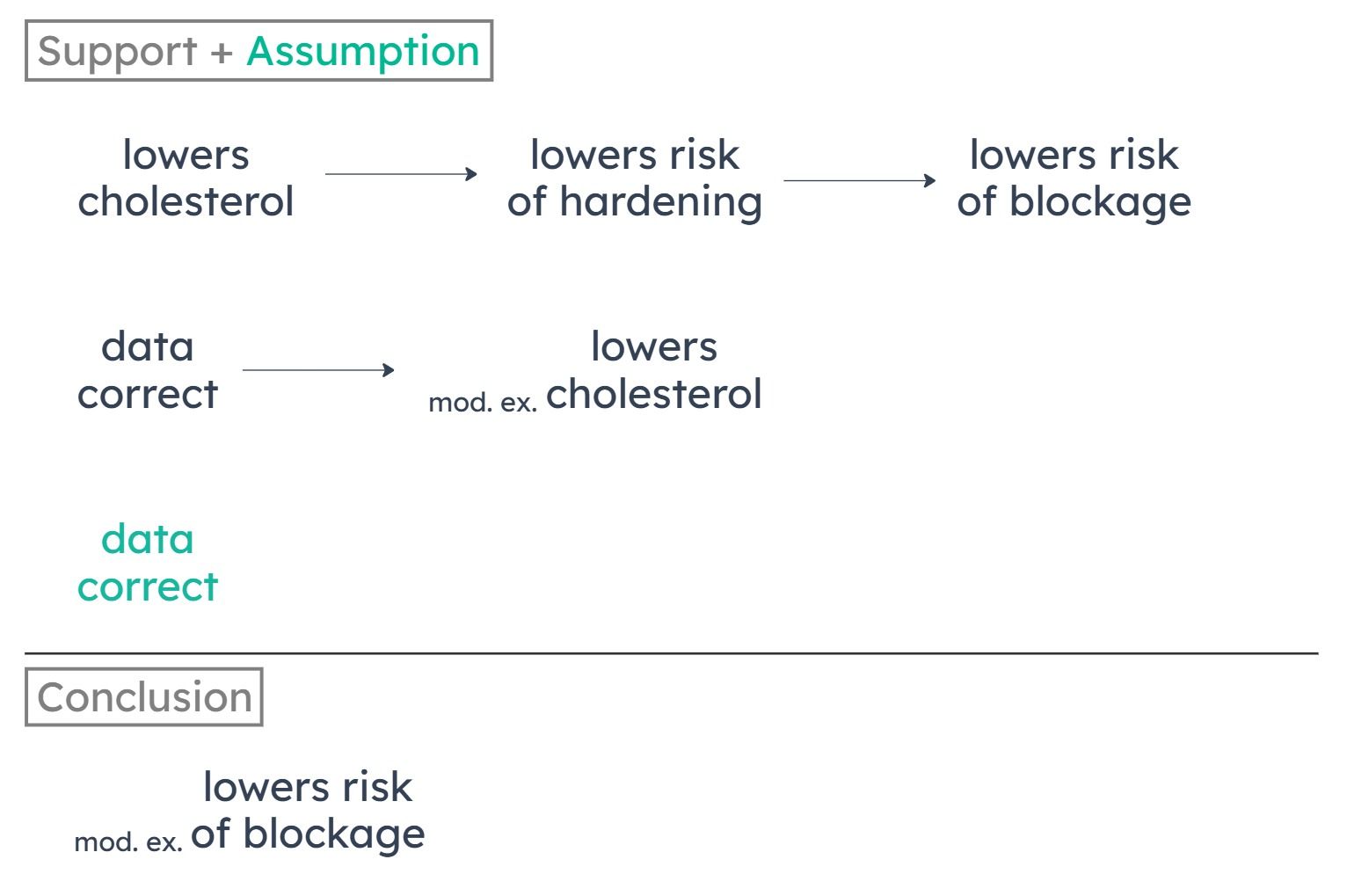Summarize Argument
After defining knowledge as a true belief formed by a reliable process, the essayist concludes we would reject a person’s claim to know certain things because clairvoyance is not a reliable process. As evidence, the essayist states that if we were to believe in clairvoyance, we would accept a person’s claims of knowledge made on the basis of it.
Describe Method of Reasoning
The essayist describes an alternative reason why we would reject a person’s claim to know certain things by means of clairvoyance. He does this by shifting the reason for this belief from the claim that clairvoyance isn’t knowledge to the claim that clairvoyance is not a reliable process.
A
asserting that the objection is based on a belief about the reliability of clairvoyance rather than on the nature of knowledge or its definition
The objection is the essayist’s agreement that we would reject clairvoyance as a case of knowledge. The essayist bases this objection by stating clairvoyance is not a reliable process.
B
asserting that the case of clairvoyance is one of knowledge even though we do not really believe in clairvoyance as a reliable process
The essayist does not assert that the case of clairvoyance is knowledge. In fact, the essayist agrees we would reject this claim. The essayist only disputes the reason for why we would reject this claim.
C
arguing against the assumption that clairvoyance is unreliable
The essayist does not think that clairvoyance is reliable. In fact, the essayist asserts that clairvoyance is not a case of knowledge because it is an unreliable process.
D
explaining that the definition of knowledge is a matter of personal choice
The essayist does not factor in personal choice when it comes to determining what is knowledge. The essayist starts his argument by defining what knowledge is, and there’s no element of personal choice in this definition.
E
demonstrating that the case of clairvoyance is not a case of knowledge and does not fit the definition of knowledge
This is the essayist’s conclusion, but this answer does not describe the reasoning the essayist undertook to reach this conclusion. The reasoning addresses why the essayist is able to demonstrate these two things.
Summary
The author concludes that moderate exercise lowers the risk of blockage of arteries due to blood clots. This is based on the following:
If it lowers blood cholesterol levels, it lowers the risk of arterial blockage due to blood clots.
If the data reported in a recent study are correct, moderate exercise lowers blood cholesterol levels.
If it lowers blood cholesterol levels, it lowers the risk of arterial blockage due to blood clots.
If the data reported in a recent study are correct, moderate exercise lowers blood cholesterol levels.

Missing Connection
To prove that moderate exercise lowers the risk of blockage of arteries due to blood clots, we want to know that moderate exercise lowers blood cholesteral levels. There is a way to prove that — if the data reported in a recent study are correct, then moderate exercise lowers blood cholesterol levels. But do we know whether the data reported in the recent study is correct? No — that’s what’s missing. We want to know that the data is correct.
A
The recent study investigated the relationship between exercise and blood cholesterol levels.
We want to know that the data reported in the recent study is correct. Whether the study investigated the relationship between exercise and blood cholesterol levels doesn’t tell us anything about whether the data is correct.
B
Blockage of the arteries due to blood clots can be prevented.
The argument concerns lowering the risk of blockage of arteries due to blood clots. Whether such blockage can be completely prevented is a separate issue from whether the risk of such blockage can be decreased. In any case, we’re looking for an answer that establishes the data in the study is correct, and (B) doesn’t establish this.
C
Lowering blood cholesterol levels lowers the risk of blockage of the arteries.
This is supported by the premises, but it’s not new information that makes the argument valid. We want to know that the data reported in the study is correct, so that we can establish that moderate exercise lowers blood cholesterol. (C) doesn’t tell us anything about the data.

D
The data reported in the recent study are correct.
(D) allows us to infer that moderate exercise lowers blood cholesterol levels. This inference, combined with the premise establishing that anything that lowers blood cholesterol levels lowers risk of arterial blockage due to blood clots, establishes that moderate exercise lowers such risk of blockage.
E
Hardening of the arteries increases the risk of blockage of the arteries due to blood clots.
This may be supported by the premises, but it’s not new information that makes the argument valid. We want to know that the data reported in the study is correct, so that we can establish that moderate exercise lowers blood cholesterol. (E) doesn’t do this.
Summarize Argument
The author concludes that Cotrell can only write average quality magazine articles. She supports this by saying that any superior articles by Cotrell must be plagiarized, because Cotrell can only write average quality articles.
Identify and Describe Flaw
This is the cookie-cutter flaw of circular reasoning, where the author’s conclusion is simply a restatement of a premise. In this case, the author concludes that Cotrell can only write average quality articles based on the premise that his superior articles must be plagiarized because he can only write average quality articles.
A
It simply ignores the existence of potential counterevidence.
The author actually discusses potential counterevidence: Cotrell’s few superior articles. She dismisses this evidence by saying that the articles must have been plagiarized, but she doesn’t ignore the existence of counterevidence.
B
It generalizes from atypical occurrences.
The author doesn’t generalize from atypical occurrences. Instead, she draws a specific conclusion about Cotrell based on all of Cotrell’s articles— the superior ones and the average ones.
C
It presupposes what it seeks to establish.
The author seeks to establish that Cotrell can only write average quality articles. In order to do so, she presupposes that he can only write average quality articles.
D
It relies on the judgment of experts in a matter to which their expertise is irrelevant.
The author never mentions or relies on the judgement of any experts.
E
It infers limits on ability from a few isolated lapses in performance.
The author does infer limits on Cotrell’s writing ability. But she does so based on his average work and the claim that his superior work was plagiarized, not based on “a few isolated lapses in performance.”
Summary
Some environmentalists don't think it's a great idea to exploit the environment, because when the environment is all used up no one can economically benefit from it. Many environmentalists don’t think it's a great idea to exploit the environment because, economics aside, the environment has inherent value.
Notable Valid Inferences
Environmentalists take different approaches to rationalizing why environmental exploitation is bad. Some focus on economic costs/benefits, while others don’t.
A
It is economically imprudent to exploit features of the environment.
This could be false. We know this is the opinion of some environmentalists—that doesn’t mean it’s true.
B
Some environmentalists appeal to a noneconomic justification in questioning the defensibility of exploiting features of the environment.
This must be true. The stimulus says many environmentalists think environmental exploitation is bad because nature has inherent value, and they don’t consider the economic benefits/costs in their justification. We know these people exist, which means (B) must be true.
C
Most environmentalists appeal to economic reasons in questioning the defensibility of exploiting features of the environment.
This could be false. We don’t anything about what “most” environmentalists think—we only know about “some” and “many”.
D
Many environmentalists provide only a noneconomic justification in questioning the defensibility of exploiting features of the environment.
This could be false. While we know many environmentalists offer a noneconomic justification against environmental exploitation, we don’t know that this is their only justification—it could be one of many.
E
Even if there is no economic reason for protecting the environment, there is a sound noneconomic justification for doing so.
This could be false. We know this is the opinion of some environmentalists—that doesn’t mean it’s true.
2:39 - Correction
In the video I labeled "no significant aspect can be controlled by a single variable" as the conclusion. An attentive 7Sager pointed out that it's actually the sub-conclusion. It's supported by an appeal to authority premise "any professional meteorologist will tell you that". The main conclusion is "I disagree."
Restructured, the Meteorologist's argument starts with an appeal to authority, supporting a general sub-conclusion, supporting a specific sub-conclusion.